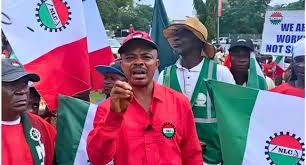By Michael Oche
The recent targeting of labour leaders, including the President of the Nigeria Labour Congress (NLC), Comrade Joe Ajaero, has raised alarm bells about the state of democracy in Nigeria.
Ajaero has been teargassed, beaten by the police, and kidnapped by security agencies – a chilling reminder of the country’s history of repressive regimes.
The renewed crackdown on workers rights began with the abduction and beating of Ajaero by the police during a protest in Owerri, Imo State, in November 2023.
Despite the global outrage that followed what happened in Owerri, where the labour leader was beaten before being released, the Nigerian government continued with the harassment.
On 3 June, 2024 journalists were surprised to receive an SOS message: “Soldiers are Presently sorrounding the venue of the meeting between Labour and Government at the premises of the SGF.” The meeting was a minimum wage negotiation between organised labour and government officials. But the deployment of armed soldiers and DSS officers was needless nd probably meant to intimate the workers representatives.
But the most shocking development came on August 19, when Ajaero was accused of terrorism financing, a treasonable offense. This move has sparked outrage among labour unions and human rights groups, who see it as a desperate attempt to silence labour leaders and suppress workers’ rights.
On August 19, a letter of invitation signed by ACP Adamu Mu’azu on behalf of the Commissioner of Police Intelligence dated claimed Ajaero’s name was mentioned in ongoing investigations connected to “criminal conspiracy, terrorism financing, reasonable felony, subversion and cybercrime.”
On Wednesday August 29, 2024, the NLC President was compelled to honour the police invitation where he was questioned.
Nigeria has a long history of suppressing workers’ voices. From the military regimes of the past to the present day, labour leaders have faced intimidation, harassment, and even imprisonment. But accusing a labour leader of terrorism financing takes it to a whole new level.
This is a dangerous precedent. Is this an attempt to silence dissenting voices and undermine workers’ rights?
The move has sparked outrage among labour unions and human rights groups. “This is a clear attack on democracy and the rule of law,” says a human rights lawyer. “The government must respect the rights of workers and labour leaders to associate and express themselves freely.”
As Nigeria teeters on the brink of democracy, the international community must take notice. The crackdown on labour leaders and the suppression of workers’ rights are warning signs of a larger problem – a problem that threatens the very fabric of Nigerian democracy.
Will the government listen to the voices of reason and respect the rights of workers? Or will it continue down the path of dictatorial tendencies, silencing dissenting voices and undermining democracy? Only time will tell.
Without a doubt, the government’s heavy-handed response to what they consider as dissenting voices, violates fundamental human rights and deepens frustration and despair.
The path to sustainable development lies in genuine engagement with the people, addressing their grievances, and implementing reforms that uplift rather than oppress the masses.
Michael Oche is a journalist based in Abuja, Nigeria’s capital



